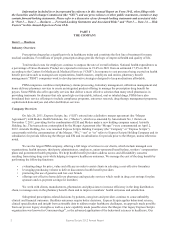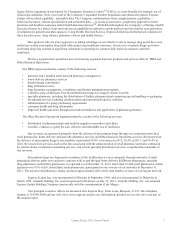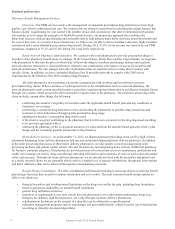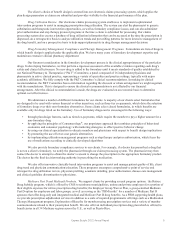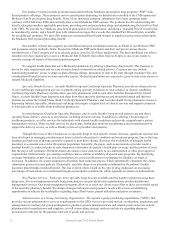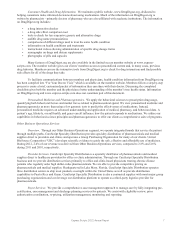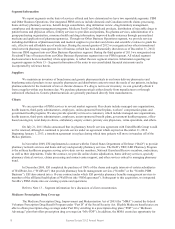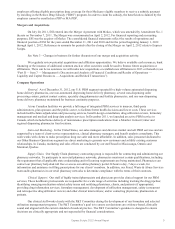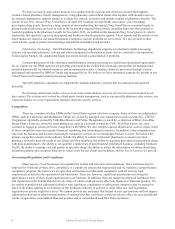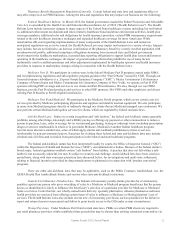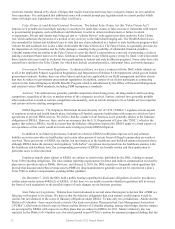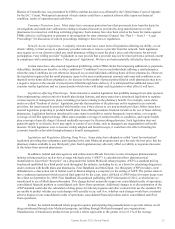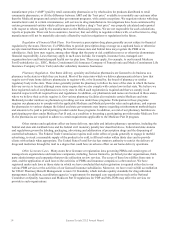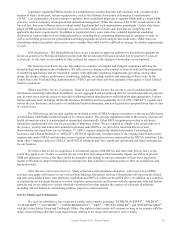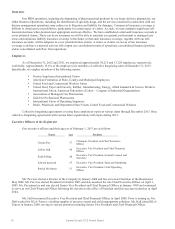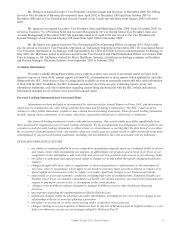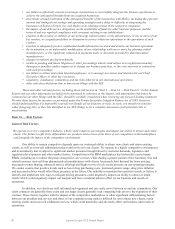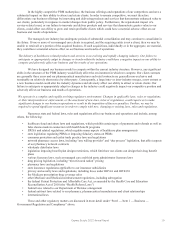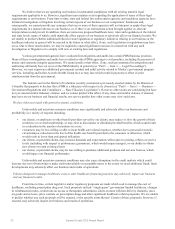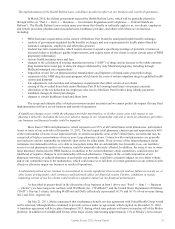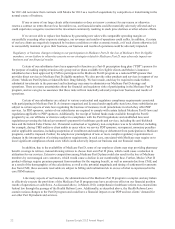Express Scripts 2012 Annual Report Download - page 14
Download and view the complete annual report
Please find page 14 of the 2012 Express Scripts annual report below. You can navigate through the pages in the report by either clicking on the pages listed below, or by using the keyword search tool below to find specific information within the annual report.Express Scripts 2012 Annual Report12
electronic transfer instead of by check. Changes that require faster payment may have a negative impact on our cash flow
from operations. It is anticipated that additional states will consider prompt pay legislation and we cannot predict which
states will adopt such legislation or what effect it will have.
False Claims Act and Related Criminal Provisions. The federal False Claims Act (the “False Claims Act”)
imposes civil penalties for knowingly making or causing to be made false claims or false records or statements with respect
to governmental programs, such as Medicare and Medicaid, in order to obtain reimbursement or failure to return
overpayments. Private individuals may bring qui tam or “whistle blower” suits against providers under the False Claims
Act, which authorizes the payment of a portion of any recovery to the individual bringing suit. The Health Reform Laws
also amended the federal anti-kickback laws to state that any claim submitted to a federal or state healthcare program which
violates the anti-kickback law is also a false claim under the False Claims Act. The False Claims Act generally provides for
the imposition of civil penalties and for treble damages, resulting in the possibility of substantial financial penalties.
Criminal statutes that are similar to the False Claims Act provide that if a corporation is convicted of presenting a claim or
making a statement that it knows to be false, fictitious or fraudulent to any federal agency it may be fined. Conviction under
these statutes also may result in exclusion from participation in federal and state healthcare programs. Some states have also
enacted laws similar to the False Claims Act which may include criminal penalties, substantial fines, and treble damages.
Government Procurement Regulations. As discussed above, we have a contract with the DoD, which subjects us
to all of the applicable Federal Acquisition Regulations and Department of Defense FAR Supplement which govern federal
government contracts. Further, there are other federal and state laws applicable to our DoD arrangement and other clients
that may be subject to government procurement regulations. In addition, certain of our clients participate as contracting
carriers in the Federal Employees Health Benefits Program which is administered by the Office of Personnel Management
and contains various PBM standards, including PBM transparency standards.
Antitrust. The antitrust laws generally prohibit competitors from fixing prices, dividing markets and boycotting
competitors, regardless of the size or market power of the companies involved. Further, antitrust laws generally prohibit
other conduct that is found to restrain competition unreasonably, such as certain attempts to tie or bundle services together
and certain exclusive dealing arrangements.
ERISA Regulation. The Employee Retirement Income Security Act of 1974 (“ERISA”) regulates certain aspects
of employee pension and health benefit plans, including self-funded corporate health plans with respect to which we have
agreements to provide PBM services. We believe that the conduct of our business is not generally subject to the fiduciary
obligations of ERISA. However, there can be no assurance that the U.S. Department of Labor (the “DOL”), which is the
agency that enforces ERISA, would not assert that the fiduciary obligations imposed by ERISA apply to certain aspects of
our operations or that courts would not reach such a ruling in private ERISA litigation.
In addition to its fiduciary provisions, federal law related to ERISA health plans imposes civil and criminal
liability on service providers to health plans and certain other persons if certain forms of illegal remuneration are made or
received. These provisions of ERISA are similar, but not identical, to the healthcare anti-kickback statutes discussed above,
although ERISA lacks the statutory and regulatory “safe harbor” exceptions incorporated into the healthcare statutes. Like
the healthcare anti-kickback laws, the corresponding provisions of ERISA are broadly written and their application to
particular cases is often uncertain.
Employee benefit plans subject to ERISA are subject to certain rules, published by the DOL, relating to annual
Form 5500 reporting obligations. The rules include reporting requirements for direct and indirect compensation received by
plan service providers such as PBMs. However, on February 4, 2010, the DOL issued two frequently asked questions that
provide that discount and rebate revenue paid to PBMs by drug manufacturers generally need not be reported on a plan’s
Form 5500 as indirect compensation, pending further guidance.
On December 7, 2010, the DOL held a public hearing regarding the disclosure obligations of service providers to
welfare plans under section 408(b)(2) of ERISA. At this time, we are unable to predict whether regulations will be issued,
the form of such regulations or the possible impact of such changes on our business practices.
State Fiduciary Legislation. Statutes have been introduced in several states that purport to declare that a PBM is a
fiduciary with respect to its clients. We believe that the fiduciary obligations that such statutes would impose would be
similar, but not identical, to the scope of fiduciary obligations under ERISA. To date only two jurisdictions—Maine and the
District of Columbia—have enacted such a statute. Our trade association, Pharmaceutical Care Management Association
(“PCMA”), filed suits in federal courts in Maine and the District of Columbia alleging, among other things, that the statutes
are preempted by ERISA with respect to welfare plans that are subject to ERISA. In 2011, Maine’s fiduciary law was
repealed. In the District of Columbia case, the court granted in part PCMA’s motion for summary judgment finding that the


